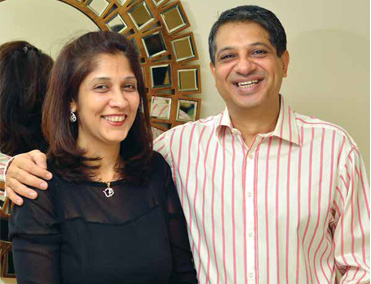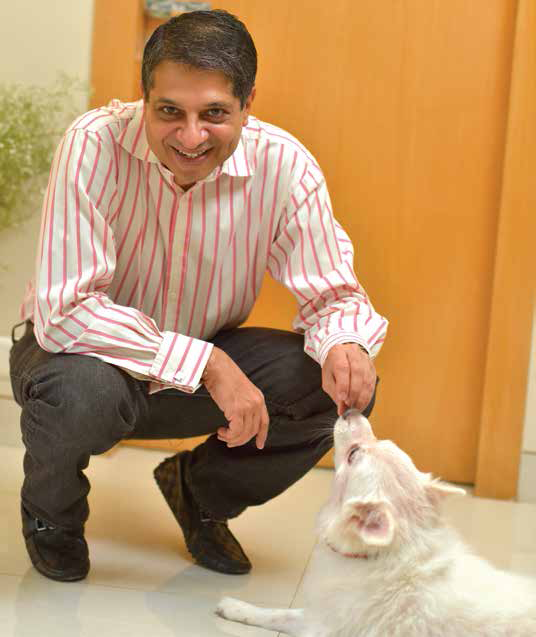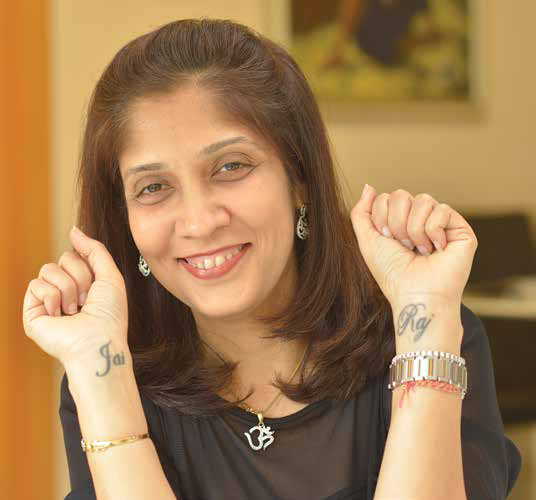Issue No.10 / June 16,2015

Raj BhamBhani, Joint Managing Director, PhillipCapital India, earlier worked with HSBC in Hong Kong, and India. His wife nita, now financial consultant to high net-worth individuals, and runs a Kumon education franchise, was at Bank of America, ABN Amro in India and Barclays Bank in Singapore. These former banking honchos have managed to chalk out their work and life to a fine balance – wielding both as meticulously as they do, their clients’ money and wealth
Nita and Raj Bhambhani, who started off their careers as top notch bankers in multi- national banks, are a picture of humility and youthful disposition. Full of zest and good-heartedness, this very dashing couple has balanced work and home with the time tested tools of organisational skills, time management and deep sensitivity to family life.
They have taken admirable command of their professional lives, with Nita aligning her jobs to the growing-up needs of their son Jai. Both also share a passion for fitness which manifests in their healthy eating habits and fitness regime.
Presently, Raj Bhambhani is the Joint Managing Director of PhillipCapital India,which offers derivatives trading across various assets classes such as equities, commodities, foreign exchange and bonds including execution and clearing service. He is also on the Board of other Phillip Group companies in India and the Middle East. A gold medallist in Engineering from IIT- BHU, and an MBA from Jamnalal Bajaj, Raj started his career with HSBC in Hong Kong and then in the Head Office in India .
Nita Bhambhani pursued her MBA in Sydenham College, Mumbai and worked in senior managerial positions at the Bank of America and ABN Amro for 13 years. Currently, she is a financial consultant for several high net worth individuals. She has also embarked on a unique educational enterprise, and set up a franchise of Japan based Kumon education, an internationally acclaimed English and Mathematics, after-school programme. This activity, which she has set up in the heart of South Mumbai at Breach Candy helps children become eager and independent self-learners.
Corporate Citizen spoke to this charming couple to find out how life can be filled with love, fun and happiness without the burden of corporate life weighing heavily on one’s head.
“For me, if there is anything related to banking, especially technical issues, iseek her guidance. i admire her banking intelligence and knowledge’’
-Raj Bhambhani
‘‘he was a gold medallist from iit; his genius reflected in the Rubik’s Cube that he solved with amazing ease.he used to keep challenging me to do it and made me learn it’’
-Nita Bhambhani

Says Raj, “At that time, the foreign banking sector was a very closely knit one. Five of my classmates of the 1992 batch of MBA from Jamnalal Bajaj Institute had got jobs at this Bank of America office, and one of them was my roommate. So I used to visit the bank often to meet them, and that’s when I got to know Nita. I found her to be extremely well informed about the intricacies of bank work and I would often reach out to her for advice or guidance. That’s how our interaction became deeper.”
One day, Bank of America had published an advertisement in a newspaper which both Raj and Nita happened to discuss. Says Nita, “We were talking over the phone about this ad which pertained to an asset product of Bank of America. Referring to a particular item in the ad, Raj said it was in the ad, and I said it was not, so we decided to have a dinner bet. After the call, we both went back and checked the ad, and I realised I had lost the bet.’’
So Nita took him out for dinner at Mings Palace in Colaba, and yes, she paid for it! But if you thought Raj let chivalry die, you are mistaken. Being an army officer’s son, he knew it was not right to let a lady pay for the meal, and that too, at the first such outing. So he reciprocated by taking her out for dinner a few days later, at Three Flights Up, a restaurant famous for its soups and salads. Says Raj, “We started as friends and then the two dinners were followed by more dinners. That’s how it all started off.’’

What about Raj’s first impression about her? Says he, “For me, if there was anything related to banking, especially any technical issue, then I would seek her guidance. She would help me out because she was very well versed with the intricacies of banking and I admired her for her intelligence and knowledge.”
States Raj, “Being in the army we always had a pet with us. We have had many dogs, a rabbit, a deer also and even a monkey for a short while. Nita was never fond of pets. After ten years of marriage, Jai and I finally made her agree to get a pet at home. That’s how we got our pet dog – Sunny. Initially she used to be scared of him. Today we believe she loves him the most and the feeling is mutual from Sunny’s end too. When we shifted to Singapore in 2010, he came with us. When he arrived in Singapore, we had to keep him in quarantine for 30 days. That was tough for us, because we were at home and he was in quarantine. We used to go every weekend and visit him and play with him in the gardens in the quarantine area. There were lots of other dogs also there. It was something we still remember.
Nita also found his company intellectually challenging. “He was a gold medallist from IIT and his genius reflected in the Rubik’s Cube that he solved with amazing ease. He used to keep challenging me to do it and made me learn it. I appreciated the fact that somebody was making you work for something better. Even with my career, he would keep guiding and encouraging me. Even now, if there is anything new to be done, I can’t take a decision without speaking to him.”

The aroma of home cooked food also inspired Raj to shift from Cuff Parade to Breach Candy, where Nita’s parents stayed. Adds Nita, “My parents were my support system. We moved back to Breach Candy in a place which was walking distance from my parents place and then five years later we bought an apartment in the same building as my parents.’’
During courtship, were there any ups and downs, or was it a cool story? Says Nita, “We had our ups and downs. We used to have fights and we continue to keep having our arguments. Once I don’t remember what we fought on. I remember there was a movie we had to go to in the evening which we didn’t go and he was not taking my call. What was the bone of contention though, I cannot recollect.’’ Again, Raj peppers the conversation with his humour, “During the courtship period there could be one or two days we would have argued... A1fter marriage, though, we can tell you lots...’’
Nita: Nita’s high profile banking career comprised working in senior managerial positions for 13 years, first at the Bank of America and then at ABN Amro Bank. Says Nita, “Thereafter, I moved on to an investment banking company called Ambit, to set up a private wealth business for the company alongwith my earlier boss at the Bank. It was a team that catered to ultra high net worth individuals -- you handle all their investments and investment advisory. You work on asset allocation, so it’s pure financial advisory. After that we moved to Singapore, as Raj was posted there. So, my last assignment was with Barclays Bank Singapore Here too, I was a part of the private banking team, positioned as Director, in 2011. We returned to Mumbai in 2013. After that I had enough of banking and wanted to change. I still handle a lot of my old clients, but on a purely advisory basis.’’
Nita’s latest foray is a unique educational enterprise through a Japanese education venture. Elaborating on it, Nita says, “I set it up at Breach Candy. It’s a company called Kumon, which is into an enrichment programme for children in Mathematics and English. I thought it was important to give back to society, after so many years of banking experience. We started it just a few months back and it has received good response. It is a different kind of a concept of learning for children between the age group of 4 and 15 years. This is an alternate method of teaching after school hours and has been in existence in Japan for more than 40 years . Mathematics and English are two universal subjects which are taught in a novel and fun way. No blackboard teaching is involved and a child is taught as per his comprehension and ability, and the child progresses steadily. We have taken the franchise rights for the programme. Plus I put in my own time commitment into it. The classes are held between 2pm and 6:30pm. That gives me enough flexibility to handle home and work.
Every Sunday, at 2 pm Nita and Raj hold a weekly meeting at the dining table with their son. It is a unique concept in which all of them express freely about all that happened in the week that passed by
Raj: I work with PhillipCapital, which is headquartered in Singapore. We have businesses in almost all the well-known developed markets in the US, Europe, Asia and Middle East. Sitting in India we look after India and the Middle East business. We undertake all financial asset services like equities, commodities, foreign exchange and bonds. Our markets work 24 hours and hence it is not a 9 am to 5 pm job for me. We take a full break on Saturdays and Sundays. We have a head office in Lower Parel, Mumbai from where I operate. We have offices in Delhi, Bangalore and Dubai. Typically my work schedule is 9 am to 6 pm at office and then I operate from home.

“So we evolved a system where my parents would be present when I went to work. I had staff at home as I did not want to bother my mother, who was also aging. I ensured that I went back home latest by 5.30-6 pm. I used to carry back work home. The bank was very supportive and they used to allow me to work from home. Then my work became more and more challenging because I had a large team at that time at the bank. Then I thought of an alternate assignment in order to balance both home as well as my job, because I didn’t want to quit working. That was when the private banking world was opening up in India and ABN Amro had opportunities there, so I moved into the private banking team. That helped me because it was a new venture which had just started emerging at that point of time.’’
“Raj, of course, has been very helpful. Whenever I had meetings, I would call Raj and request him to be at home. I knew his priorities, but if something did come up that I could not avoid, I would tell him.”
Adds Raj, “We definitely time-shared. If she had a busy day on a particular day then I would chip in and be there. Weekends, I would be with him more, but on a normal Monday to Friday weekday, it was only at night that I would be present. Nights, I would look after him, and mornings, she would be there.’’
Every Sunday, at 2 pm Nita and Raj hold a weekly meeting at the dining table with their son. It is a unique concept in which all of them express freely about all that happened in the week that passed by. Says Raj, “We ensure to meet up at 2 pm on Sundays and we call it a family meet, where each one of us gets a platform to speak. Jai airs his complaints whether it is about his mother, or about a certain issue I was unaware of. Sometimes we also point out something about him. ‘‘
If women who have quit their jobs are happy looking after their home and children, then it is good for them. Your inner self has to realise what makes you happy and you should do that. If that does not make you happy, then there is no point sitting at home and cribbing; then you might as well go out and do what you like -Nita
Raj : My upbringing was as an army officer’s son, and hence discipline has been a part of my life. I guess I’ve adopted a mixed approach -- trying to discipline Jai and at the same time also making sure he has all the fun of childhood. We always make sure that as far as education is concerned, seriousness is maintained. Apart from that, whatever he wants, sports related or otherwise, we have been quite liberal. He is interested in sports and right now is majorly into cricket. We do swimming together very often on weekends and also play tennis and cricket. Jai is a very intuitive child. I take all my technology issues to him. He thinks differently. There are times when he surprises us.
Nita: I think we both are doting parents and I’m quite okay with it. People have told me that my child would get spoilt, but over a period of time they do graduate. For example, he now understands a lot of things. He tells me to stop mollycoddling him. He is mature enough to understand that though we do love him, when things are not under control and we want to pull it back from him, he knows we can do that. So he has that fear as well for both of us.
Nita: One challenge as a working woman is that you have to adjust your life. Everybody talks about adjustment, but actually you have to fine tune your mind to whatever you are doing. If you are happy, there is no right or wrong answer, that is what I have realised over the years. If women who have quit their jobs and are happy looking after their home and children, then it is good for them. Your inner self has to realize what makes you happy and you should do that. If that does not make you happy, then there is no point sitting at home and cribbing; then you might as well go out and do what you like. Even when you are back home from work, you are still thinking in terms of what needs to be done the next day. But when you have a kid at home it is very easy to switch off. It happened to me. Before Jai was born, I would carry work home, but once Jai was born, when I reached home, I switched off. Then I only had time for him.
Nita: I think SEBI’s mandate for a woman director is good, but how well and judiciously it will get implemented is the key question. You shouldn’t have a woman just as a dummy director on the board. If you are taking in a woman director, then it should be in the true sense, because then you will have somebody who will have valuable inputs for the organisation. By just trying to do it from the compliance perspective will not work. The only thing to be careful about it is nowadays along with compliance issues, responsibilities will come with it. Unless you know the company, unless you know the management, unless you know you are going to play a key role in it, you should be careful. A lot of these companies are family owned and mostly male dominated. But we are beginning to see a change in second and third generation business families -- more women taking charge, incrementally.
Raj: My message to today’s youngsters would be that, independent of which institute you are coming out from, while joining a company, first look at the industry you want to get into. Check out who are the top five players of the industry and then work towards getting a job in those, independent of the compensation they give. I am a mentor to some youngsters in my organisation as well as few working outside, and I always tell them that they should follow their career path; the money will eventually catch up and follow. But if you follow the money line, your career line will deviate, and down the line you will see the downfall.
Raj: I have majorly worked in MNCs. If you see the top man in an MNC, be it at the country or at the global level, it will always be a person who has worked for at least ten years in that company. In Indian firms too it is the same. For example ICICI, which we have seen grow enormously in a short period of time. The current MD, who is also a Bajaj alumni had the first job in ICICI straight from the management institute and is currently at the top most executive position. In the long run, loyalty will always overplay, as long as you have that above- average intelligence. You cannot be dumb and loyal and think you will survive. If you are smart and loyal, you will strike over another person who may be smart but not as loyal.
Raj: Let’s go back to 1992-93. At that point of time, banking was a job, where we used to sit in rooms on fancy desks and client used to walk in. That was the case in HSBC and other MNC Banks. I used to start my day at 8 am, have a lunch break for one or two hours, leave or home at 5 p m, go to a club, and the next day worked out similarly. Then the revolution happened with private banks coming in, with HDFC and ICICI taking a lead and others following suit. The trend changed. Bankers started going out to clients as competition increased with the increasing number of banks. Then with Kotak Bank and Yes Bank, competition intensified and that was when banks moved from their traditional business of lending and borrowing, to a fee based business.
Banking is basically taking money from clients who have extra money and giving it to somebody who needs it, and as far as you are concerned, you earn interest. But since the margins reduced and competition intensified, they started going to fee based business by trying to earn from clients through advisory; trying to give them products and earn through those products; selling insurance products, etc. That was when the individual client, particularly at the mid-level, started getting the feeling that he was getting over charged. Whether it was maintaining a minimum balance or anything else you did, there was a fee behind it. The regulators eventually stopped it to a large extent. We still believe that old banks in the traditional model do fee business purely on the product that they want to offer. Some banks who have moved heavily into retail, probably made this their core business and that is where customers feel they are being over charged or there has been a case of mis selling.
Now with mobile communication and technology, you don’t have a banker coming home. You don’t visit the bank. You just need a cell phone or an iPad or a computer. It is a very non-personalised way of doing a transaction. Technology has definitely made banking more transparent. That’s also one of the reasons why banks have pressure on their bottom lines, because charges, transaction, exchange rates, all have become transparent. Banks made a lot of money in foreign exchange. With the foreign exchange market having become so transparent, banks can’t earn as much as they did earlier. Technology has helped the client, may have helped bankers due to larger volumes, but reduced their spread. It has become citizen friendly.
From a savings economy we are slowly trending into a credit economy, in the same way that USA and Europe had moved – so we need to be cautious. It is a standard statement we give to our own clients -- if your earning is x, make sure that you save 20% of that every month or every year. The balance, you decide what you want to do with it, invest, or expense. But save means ‘save’, not even invest. Which clearly means that you cannot go on the credit side. Whether it is SIP, provident fund, fixed deposit, save it as cash. With the rest, depending on your earning capability and expenditure, you can decide what you want to do -- which clearly means, definitely don’t go on credit.
Nita is the banker in the house, so she looks after all the domestic money matters. I am more in the market side and since you are so deeply involved in it, you don’t put your money in the equity market. We normally put it in real estate. Gold is a natural hedge against any calamity, any scare in the capital market or in any country. From that perspective, yes, I would recommend that some part of investment should be in gold.
Depending on the age profile, if you are in your formative years, you can take a little exposure to the equity market. Over a period of time equity does give you good returns. I am not talking about one-two-three years but a good five-six-seven years. So about 20%-30 % can easily be held in equities. About 50%-60% can be in investments like fixed deposit, mutual funds, or various other capital market products. After that, go for alternate investments like real estate, art, gold and cash. The percentages can vary. You should hold around 10%-15% in liquid cash, from where you can withdraw easily. You should have cash in case you get any opportunity to invest in the market.
Why didn’t he join the army? “The option was always there. At least when my time came, I was eligible to give the NDA entrance examination and even applied for it. We were in Bareilly and the closest test centre was in Lucknow that year. However, on the day of the NDA test, I had a very important exam in school because of which I had to skip the NDA entrance test. Then after that I got into the IIT, so I guess it was just the way things flowed. I would still like the army life a lot if I had the choice to change.
Do youngsters have any money sense? Says Raj, “In the first 5 to10 years of their careers they do not, after that they start understanding. If they start doing it early that would be better for them. With a couple, it varies. The first thing they want, is to buy a house. Once you achieve that then you can focus on other things.”
Raj: In whatever you do, strive to be number one, or two. Secondly, however much you have grown in life, never lose your hunger for growth. So there should be no end to what you have achieved. For us, we say success is not a destination, it is a journey, a journey which you have to continue. Thirdly, in life there is give and take, so if you are getting so much, you have to ensure that you give back a part of it. How much and to whom is not important. Unless you do that, you will never have a balance.
Nita: You can’t judge people. When somebody is behaving in a certain manner, then you ought to realise that he is doing it for some reason.
We love to go on holidays. Weekends are meant for some sport activity or the other. We realise that as we are going 40+, our health is important. So we are quite conscious of that.
By Vinita Deshmukh